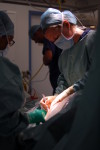
Osteoporosis
Depression often co-occurs with arthritis and arthrosis says new research
 People with symptoms of depression have increased risk for arthritis, arthrosis and other physical diseases, says a study published in Frontiers in Public Health.
People with symptoms of depression have increased risk for arthritis, arthrosis and other physical diseases, says a study published in Frontiers in Public Health.
A research group looked at data from 14,348 people aged 15 years and older who lived in Switzerland.
About one-third-of people with depression also had at least one physical disease. Continue reading
Women have less complications than men after knee and hip replacement ops – new research from Canada
 Complications and the need for revision surgery after major joint operations are rare, but men face slightly higher odds, according to research presented at the 2015 Annual Meeting of the American Academy of Orthopaedic Surgeons.
Complications and the need for revision surgery after major joint operations are rare, but men face slightly higher odds, according to research presented at the 2015 Annual Meeting of the American Academy of Orthopaedic Surgeons.
A team looked at data on total hip and knee replacements in a Canadian hospital over a seven year period. There were 37,881 total hip replacements (53.8% female) and 59,564 total knee replacements (60.5% female). Continue reading
Safe to drive two weeks after hip-replacement surgery, US experts claim
 Advances in surgery, pain management and rehabilitation mean that people who have a total hip replacement may be able to safely drive as early as two weeks after surgery, according to research presented at the 2015 Annual Meeting of the American Academy of Orthopaedic Surgeons.
Advances in surgery, pain management and rehabilitation mean that people who have a total hip replacement may be able to safely drive as early as two weeks after surgery, according to research presented at the 2015 Annual Meeting of the American Academy of Orthopaedic Surgeons.
Previous studies, conducted over a decade ago, recommended between six and eight weeks of recovery before driving. Continue reading
Vitamin D may help prevent and treat osteoporosis, high blood pressure and cancer
 Vitamin D may play a vital role in the prevention and treatment of diseases associated with ageing but not enough research has been done in the area, scientists explain in the Journal of Aging and Gerontology.
Vitamin D may play a vital role in the prevention and treatment of diseases associated with ageing but not enough research has been done in the area, scientists explain in the Journal of Aging and Gerontology.
The number of people aged 65 years and older is expected to more than double from 2012 to 2060. Older adults are at risk for vitamin D deficiency due reduced time outdoors and poor skin absorption of the nutrient. Continue reading
More regulation of total hip replacement devices needed to prevent unnecessary surgery in the UK
 Experts are calling for greater UK compulsory regulation of devices used in hip replacements to reduce the need for further traumatic and expensive surgery following a study published in the British Medical Journal.
Experts are calling for greater UK compulsory regulation of devices used in hip replacements to reduce the need for further traumatic and expensive surgery following a study published in the British Medical Journal.
A team from Warwick Medical School looked at five of the most commonly used hip replacement devices and assessed how many had to be replaced within 10 years of the original surgery. Continue reading
